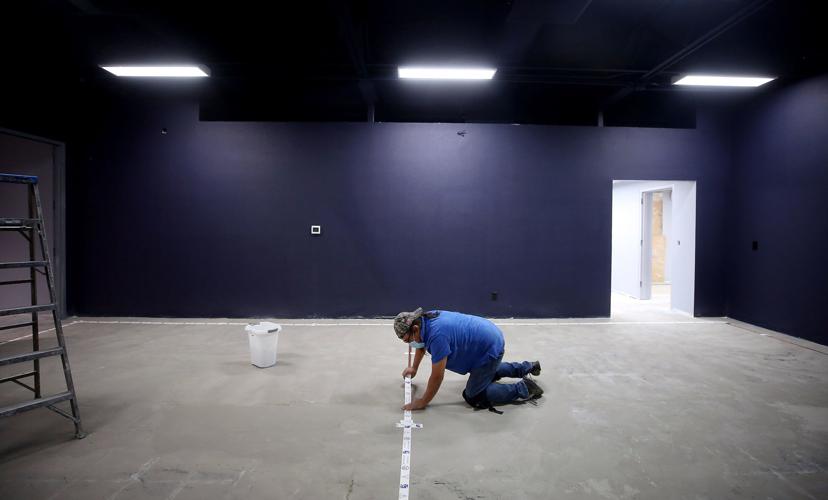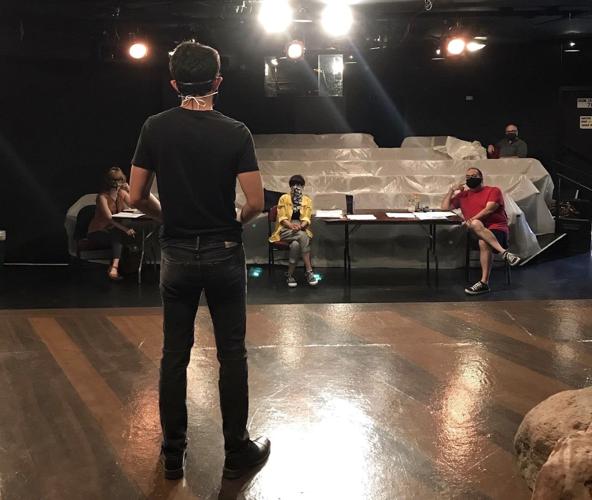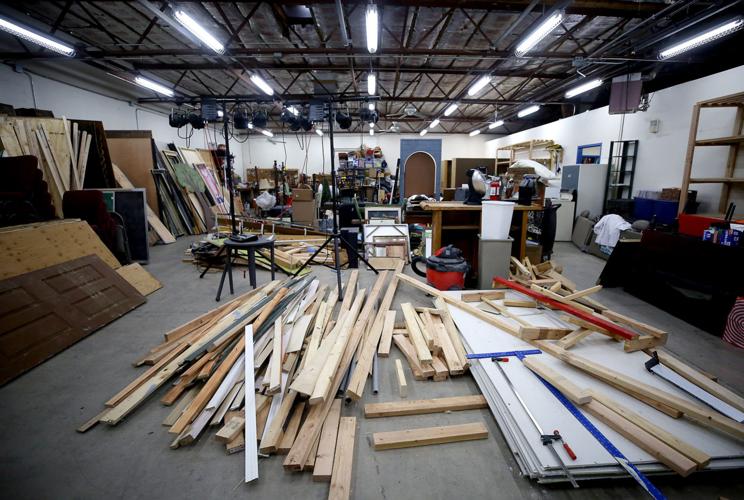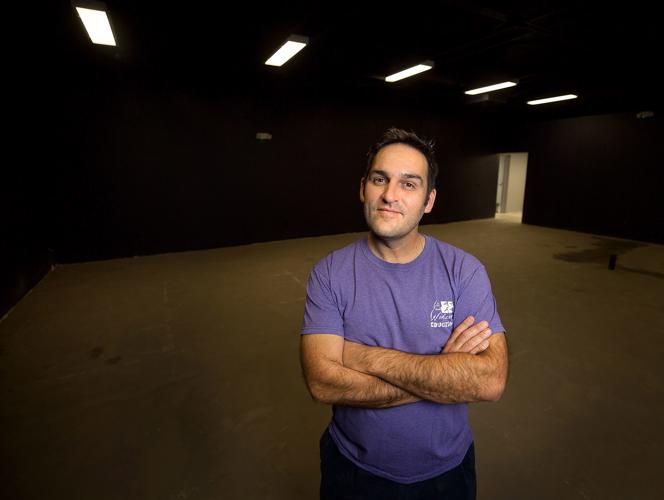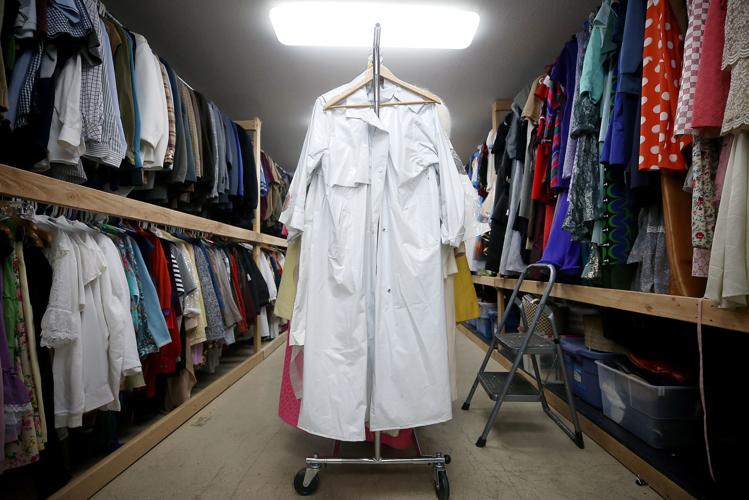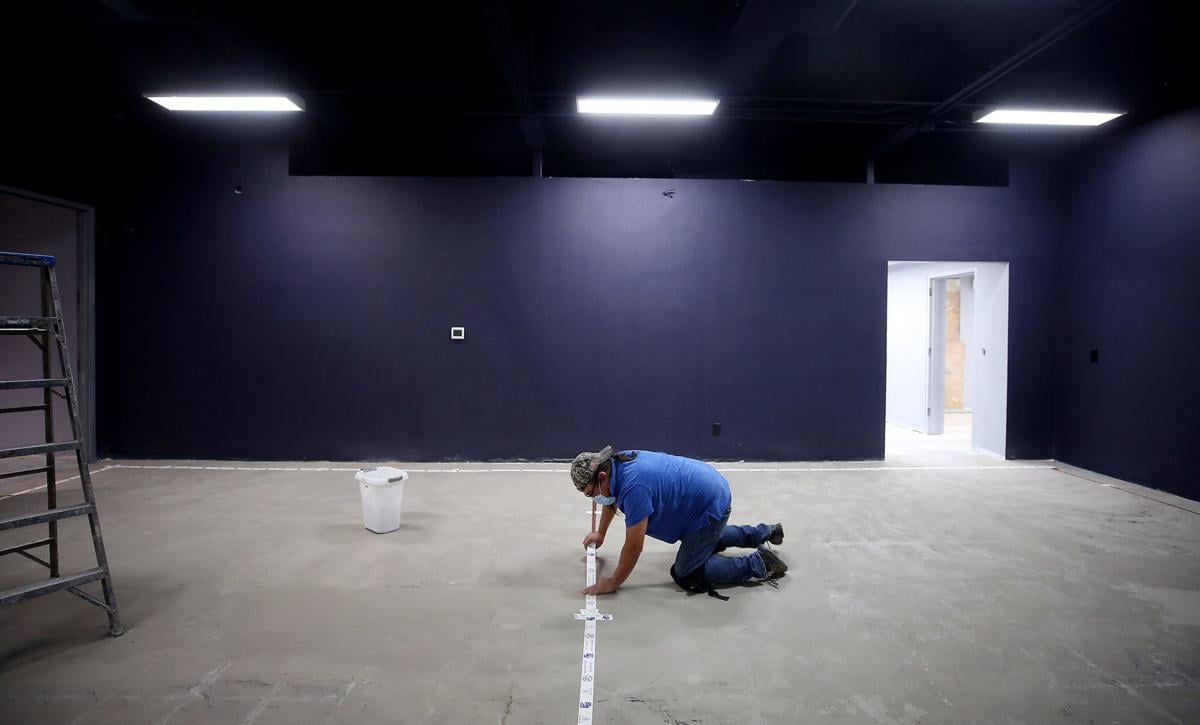The theaterscape will be very different once audiences can sit down to see a play again.
Tucson theaters, all of which cut their 2019-20 seasons short because of the COVID-19 pandemic, are cautiously planning to mount plays come September.
But they are also planning to do programs and tickets digitally, leave empty rows and seats between people, deep clean between shows, eliminate snack bars, and explore creative ways to bring theater to the community.
“We plan to be at 30% houses,” said Cynthia Meier, co-founder and executive director of The Rogue Theatre, which seats around 100. “We’ll take out rows and leave two seats between people.”
That “boutique seating,” as Susan Claassen refers to it, is also planned for Invisible Theatre, where Claassen is managing artistic director.
That reduced seating, combined with other coronavirus-related losses, will put Invisible Theatre down about $50,000.

With masks and blocked off seating, rehearsal is held at Invisible Theatre in Tucson. Susan Claassen, Invisible Theatre’s managing artistic director, is at center, in yellow.
Invisible Theatre and other theaters also plan to stop ticket sales 24 hours in advance, eliminate walk-ins, and require audience members to wear masks.
Safety precautions are almost the easy part.
A recent national survey from Shugoll Research found that most avid theater goers — 63% — will probably wait at least a few months or more before seeing a play. And almost 30% of those surveyed said they would wait six months or more.
“There’s a lot we are going to have to do to reassure audiences,” said Joseph McGrath, The Rogue’s artistic director and co-founder. “The big challenge is getting people to come in.”
With the virus ever present, so is angst. So touching doorknobs, using public restrooms, and standing too close makes many nervous.
“Part of what makes theater so fantastic is you feel you are in good hands,” said Sean Daniels, Arizona Theater Company’s artistic director. “At some point, if it becomes too stressful, you won’t do it.”
Another consideration for ATC and The Rogue is that the Actors Equity Association is not issuing any contracts. The actors’ union is working with public health expert Dr. David Michaels to develop health and safety standards, said Brandon Lorenz, Equity’s director of communications.
Both ATC and The Rogue employ union actors.
Lorenz said there is no target time to reissue contracts again; Broadway theaters are union and are closed at least until September.
But this virus has also given birth to some out-of-the-box thinking.
“We are thinking outdoor cabaret theater and drive-up theater,” said Michael Martinez, executive director of Live Theatre Workshop, which has moved to a new location with a generous parking lot.
Over at Scoundrel & Scamp Theatre, actors have recorded Russian folktales for children, there is radio theater, and it sells tickets for “Late Night With Scoundrels,” an hourlong variety show with Tucson talent. That streams on Youtube and the next is slated for June 12 (scoundrelandscamp.org).
Unscrewed Theater has weekly virtual improv shows that have been keeping their audiences feeling cheery (unscrewedtheater.org).
And Arizona Theatre Company has been busy with digital content, streaming plays and doing twice-weekly podcasts with artists from around the country. There are new episodes every Friday and Sunday on ATC’s website, arizonatheatre.com.
If theaters open to limited audiences, or not at all for the next season, they’ll be faced with a financial crisis.
“Disappearing for a year would be devastating for The Rogue,” said Meier, who figures the company will lose about $90,000 when the limited seating goes into effect for the fall shows.
“We are taking it week by week, month by month,” said Bryan Falcón, Scoundrel & Scamp’s artistic and managing director. “So far, we’ve had an amazingly gracious landlord who has bent over backwards.”
“It will be a struggle,” said Martinez, who estimates Live Theatre will lose about $250,000 in revenue by December — about half of the organization’s annual budget. “We’ll have to make steep cuts. It will be rough but it’s something we can financially weather.”
ATC, which has fought financial woes for a few years now, is ready to fight some more.

One of the larger spaces in the Live Theatre Workshop building, 3322 E. Fort Lowell Road, is serving as storage space for the moment but will be the theater set workshop.

“We’ll have to make steep cuts. It will be rough but it’s something we can financially weather,” said Martinez, of how much revenue the Live Theatre Workshop is expected to lose.

Michael Martinez, executive director of Live Theatre Workshop, estimates it will lose about $250,000 in revenue by December — about half of the organization’s annual budget.
“We will be smaller when we come out of this,” said Daniels. “The first step is to keep the same quality of programming. We’re going to have to trim in a lot of places … We’ll have less administrative staff, less production staff, and we’ll have to be super mindful of everything we do to spread money as far as it can go.”
Photos: Flags placed on graves at Tucson cemetery for Memorial Day
Memorial Day flags
Updated
Jaime Aviles, who served in the U.S. Navy from 1974-79, places American flags on the graves of military veterans for Memorial Day at Evergreen Cemetery, 3015 N. Oracle Road, Tucson, on May 23, 2020. Aviles and wife Cathy joined other members of the American Legion and Veterans of Foreign Wars to honor nearly 9,000 veterans buried at Evergreen Cemetery. Aviles' father served aboard the famous aircraft carrier USS Lexington in World War II. His brother and uncles served in Vietnam, Korea and World War II. Aviles' son is a U.S. Navy commander and graduate of Canyon del Oro High School and the U.S. Naval Academy.
Memorial Day flags
Updated
Jaime Aviles, right, who served in the U.S. Navy from 1974-79, along with wife Cathy Aviles, places American flags on the graves of military veterans for Memorial Day at Evergreen Cemetery, 3015 N. Oracle Road, Tucson, on May 23, 2020. They joined other members of the American Legion and Veterans of Foreign Wars to honor veterans who have died.
Memorial Day flags
Updated
Bob Crawford, who served in the U.S. Navy from 1963-91, dusts off a grave marker as Bill Garris, U.S. Air Force, 1966-70, places American flags on the graves of military veterans for Memorial Day at Evergreen Cemetery, 3015 N. Oracle Road, Tucson, on May 23, 2020.
Memorial Day flags
Updated
American flags on the graves of military veterans for Memorial Day at Evergreen Cemetery, 3015 N. Oracle Road, Tucson, on May 23, 2020.
Memorial Day flags
Updated
Bill Garris of American Legion Post 132, who served in the U.S. Air Force from 1966-70, carries American flags to place on the graves of military veterans for Memorial Day at Evergreen Cemetery, 3015 N. Oracle Road, Tucson, on May 23, 2020.
Memorial Day flags
Updated
Bill Garris, left, and Bob Crawford, of American Legion Post 132, place American flags on the graves of military veterans for Memorial Day at Evergreen Cemetery, 3015 N. Oracle Road, Tucson, on May 23, 2020.
Memorial Day flags
Updated
Members of the American Legion place American flags on the graves of military veterans for Memorial Day at Evergreen Cemetery, 3015 N. Oracle Road, Tucson, on May 23, 2020.
Memorial Day flags
Updated
Members of the American Legion place American flags on the graves of military veterans for Memorial Day at Evergreen Cemetery, 3015 N. Oracle Road, Tucson, on May 23, 2020.
Memorial Day flags
Updated
American flags on the graves of military veterans for Memorial Day at Evergreen Cemetery, 3015 N. Oracle Road, Tucson, on May 23, 2020. The Veterans of Foreign Wars and American Legion placed nearly 9,000 flags at veterans' graves at the cemetery.


